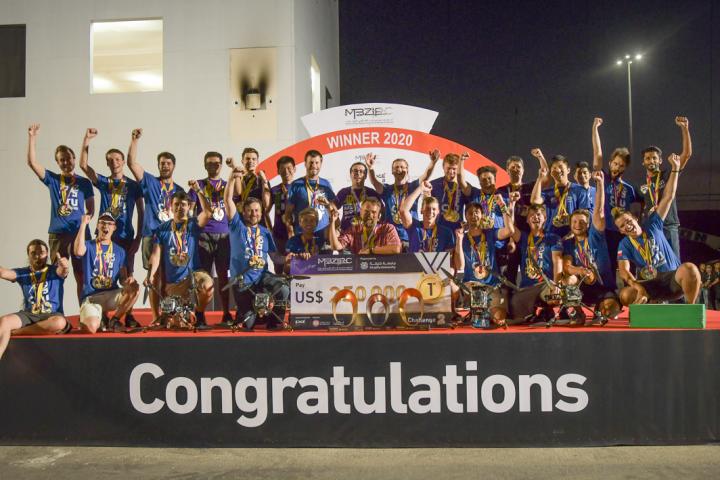
During the first two days, the drones could compete in three categories. The first (Challenge 1) consisted of detection and destruction of balloons, the second (Challenge 2) had the drones and ground robot pick up colored bricks and set them on a predefined wall, and the third (Challenge 3) was to extinguish a fire using drones in cooperation with the ground robot.
The program of the third day of competition was the Grand Challenge, a combination of all disciplines. This competition is difficult because in a very limited time, drones and robots have to meet demanding tasks, combining several tasks from previous challenges during which conditions have changed operatively.
Under the leadership by Martin Saska, the multirobotic systems team of the Faculty of Electrical Engineering CTU in Prague defended the huge success of 2017. Indeed, the scientists had prepared thoroughly for the competition. Under the different desert conditions prevailing in the United Arab Emirates, they went to test machines in January this year, which proved to be a very smart strategy.
The team leader Dr. Martin Saska describes preparations and the atmosphere of the competition as follows: “From the experience of the previous competition we knew that preparation for such a demanding competition at the venue was necessary. Only in this way can drones be tuned for local conditions. Our solution proved to be the most reliable and one of the few we managed to successfully complete all disciplines in the autonomous regime. I have to thank all our team members for working at 100% and very often at the expense of their own sleep, as we were preparing for the contest as well as during the contest. ”
Prof. Oldřich Starý, vice dean of the Faculty of Electrical Engineering, who also spectated the competition, said: “Our students once again succeeded in the competition against world class universities such as ETH Zurich, Georgia Tech, University of Tokyo, KAIST, Carnegie Mellon University, or Virginia Tech. During the competition, I saw many interesting technical solutions, but also many pitfalls that some teams simply could not cope with. This is where I see our main advantage, our scientists are able to react promptly to the situation and adapt to it quickly. ” Their solution to some tasks was fascinating in this respect. ”
JF Potužník, general commissioner of the Czech Republic's participation in the EXPO 2020 General Exhibition, who attended the final presentation of Czech drones and the award ceremony, commented on the team's success as follows: “It's a world success - I can't imagine EXPO 2020 in Dubai, a week ago CTU formulas performed in Abu Dhabi, today drones ... I feel our EXPO in the UAE has already begun. ”
Scientists from the CTU FEL Multi-Robotic Systems Group receive $ 250,000 in reward for winning Challenge 2. The International Jury has decided not to award the Grand Challenge prize this year and to make the funds available to secure the next years of the competition.